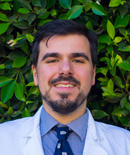Interview with Francisco Alvarez, MD
A Conversation with Francisco Alvarez, Assistant Clinical Professor
Share a little bit about yourself.
I was born and raised in South Florida from a Cuban and Puerto Rican background. I went to Harvard University where I majored in History and Literature, and I wrote my senior thesis on the Spanish philosopher José Ortega y Gasset. After college, I spent a year at the NIH doing neuroscience research on neural correlates of probabilistic learning in humans. Then I went to Columbia University for medical school and completed my internal medicine residency at Johns Hopkins Hospital. In my free time I love traveling. I have traveled around most countries in Latin America and visited many places in Europe and Asia — although I need to do much more!

Every family has their own traditions. What’s your favorite family tradition?
I spend all year looking forward to Nochebuena, the Christmas celebrations held on December 24 in Spanish-speaking countries. Some of my fondest childhood memories are from these celebrations, filled with people chatting, eating, and dancing. Every year my family prepares a lechón, a large roasted pig. For as long as I can remember, my cousins and I would go with our grandfather to choose the pig. My grandfather had a bunch of rules about how to choose the pig, for example, you don’t want the largest pig because the meat is all fat, and you have to wrangle the pig yourself and the pig had to put up a vigorous fight — if not, it meant that the pig was sickly and the meat wasn’t good to eat.
Some people live to eat, while others eat to live. Are you more of a “work to live” or a “live to work” type of person?
I think I’m slowly turning from a “live to work” person to a “work to live” person. When I was younger, I was a workaholic. I still am somewhat, but I’ve come to appreciate optimizing my work to enhance my non-work experiences. One of the downsides of previously being a “live to work” person, which the COVID-19 pandemic made me acutely aware of, is that I never really developed many true hobbies (I like to read and write — but that’s kind of like work!). So, I’m working on that more now, and as I hope to one day have children, I imagine the work-life balance will shift even further.
What do you regret not doing when you were younger?
Many things! I remember when I was in college, I visited some of my family in Spain, and one of my older cousins wanted to take me on a short trip to Morocco. On the phone with my mother (who was in the US), she forbade me from going. Even though I was no longer living at home, I obeyed her, and I still regret it. Overall, when I reflect on my life thus far, there are very few things that I regret doing, but many things that I regret not doing. So, I try to keep that in mind going forward in life — I try to push myself out of my comfort zone as much as possible.
What is your greatest fear?
Cockroaches. When I was young, my parents gave me one of those large picture science books with detailed drawings of bugs, and it freaked me out. On an elementary school trip to Washington, DC, we visited the National Museum of Natural History and one of my classmates decided to play a prank on me. He surprised me with a live roach, and I gave out a loud yelp. I guess the teacher thought I did it intentionally and I was put on probation for the rest of the trip. I wasn’t allowed to sit with the rest of the kids, and when we got home the teacher spoke with my parents about me being disruptive in the museum.
With the fast-paced world today, people often inevitably experience stress. Is there an activity that instantly calms you?
I love jogging to clear my mind, especially near a waterfront. Back in medical school in New York City, I would jog down Riverside Park on the bank of the Hudson, and in Baltimore I would jog around the harbor. In fact, I’m going to go for a jog right after this interview!
- by Lena Loo
View Francisco's professional bio | Go back to interviews
